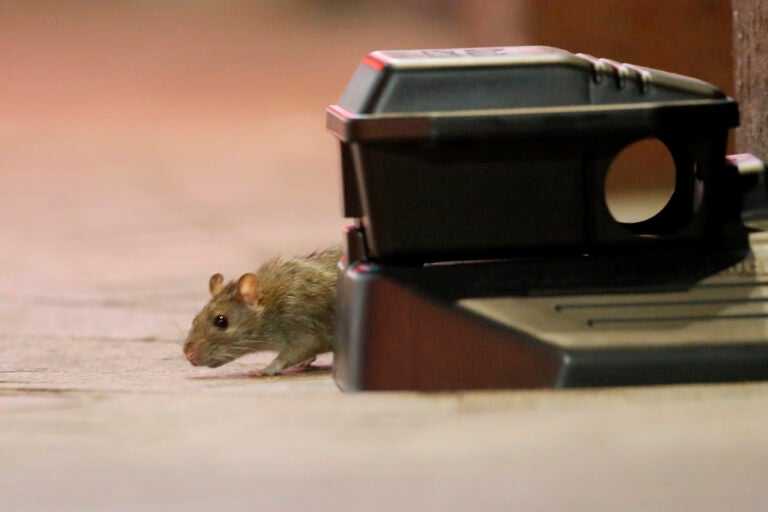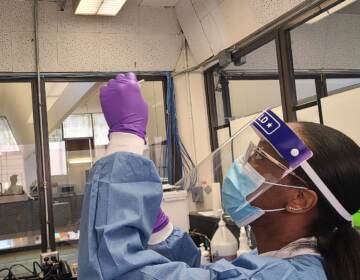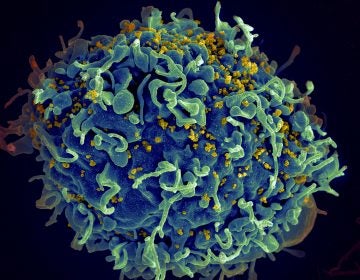Humans stay home because of the coronavirus. Some rats follow
Those restaurant dumpsters aren’t full of food waste anymore, so opportunistic rodents are going the residential route to fill their bellies.
Listen 1:21
A rodent walks around a device with poisonous bait on Bourbon Street in New Orleans, Monday, March 23, 2020. Complicating New Orleans' fight against the new coronavirus spread, rats and mice are abandoning their hiding places in walls and rafters of shuttered businesses and venturing outside. (AP Photo/Gerald Herbert)
Are you on the front lines of the coronavirus? Help us report on the pandemic.
As people change their behavior because of the coronavirus, so do rats.
Charles Evans, a pest-control operator who has worked in Philadelphia for more than 10 years, described it as rats adapting to our new habits. For example, Center City has a lot of restaurants and there are usually dumpsters full of food waste in the alleys behind them. But now, everything is shut down because of the pandemic.
“Rodents, they’re opportunists, they’re going to adapt, so they’re moving into residential homes, apartment complexes and buildings,” Evans said.
They might be roaming around in the open, hungry and looking for new sources of food, or they might go through the sewer system.
“All a rat needs is a circumference the size of a quarter to get into a building,” Evans said. “If they can get their face through there, they’re coming into the property.”
He said he cleaned up a house recently where he and his colleagues pulled 20 rats out from various spots: pet food containers, cabinets, and under a bathtub.
“They definitely made their home the rats’ home, they came in and took over,” Evans said.
There could also be more rat colonies fighting over the scarce food scraps remaining outside dumpsters and the restaurants that are still open, said Robert Corrigan, a researcher who has studied rodents for 30 years and is now based in New York City.
“People have reported in a couple times that they’ve seen squabbling, that’s the word that they use, and fighting,” he said, adding that he has seen these fights himself.
“These fights are brutal … rats will go on fighting sometimes for several minutes to the death, sometimes the one that loses gets dragged off and eaten.”
He said people have reported more squeaks and high-pitched shrieks from these fights everywhere from Boston to Washington, D.C., and compares them to rival gangs fighting over turf. The scientific term is interspecific competition.
Still, just because you may see and hear more ravenous rats, that doesn’t mean there are necessarily more of them.
The good news is that pest control is considered essential, so exterminators and infestation specialists are still operating as usual. The best thing to do for members of the public who spot concerning numbers of rats in their area, Garrow said, is to call city-run Vector Control at 215-685-9000.
In some places, there might actually be more rats in the summer after social distancing. Tuomas Aivelo, an ecologist and coordinator of the Helsinki Urban Rat Project at the University of Helsinki in Finland, said it has been an unusually warm winter there and pest management companies tell him they have had fewer orders than usual. The combination of less cold weather and less rodent control could mean more rats in Helsinki in the summer.
If you don’t want your home to be the new home for hungry rats, make sure everything is properly sealed, including gaps under doors, electrical lines, sewer caps, and pipes, Evans said.
Corrigan, who has advised many cities and places like airports and shopping malls on rat control, said the most important thing is not to leave out any open food waste, which rats will interpret as a daily reward.
“Because of this pandemic, we are being taught how to wash our hands, and if you think about that, it’s kind of crazy. We’re all adults and this is something we should have learned how to do properly in second grade,” he said. “Maybe this is something we should revisit … how to take out the trash.”
“You only need one property out of 10 beautiful properties, and that one property feeds the entire block’s rats.”
Part of his work is to help people kill rats, but he prefers to keep them out instead of killing them.
“The smartest and most humane way you can treat this great animal is not to lure it to our property by tricking it and putting out garbage and then … kill it with a glue trap or a snap trap or poison bait.”
“We owe more thanks to the rat and the mouse than any other mammal on Planet Earth because our longevity, our health, everything we do with pharmaceuticals and cosmetics, everything we know about ourselves internally and externally … we owe to the rat.”
WHYY is your source for fact-based, in-depth journalism and information. As a nonprofit organization, we rely on financial support from readers like you. Please give today.




![CoronavirusPandemic_1024x512[1]](https://whyy.org/wp-content/uploads/2020/03/CoronavirusPandemic_1024x5121-300x150.jpg)




